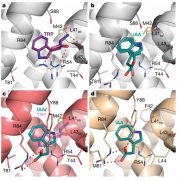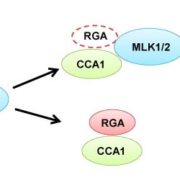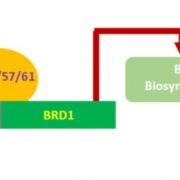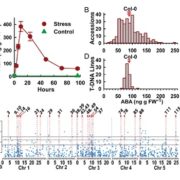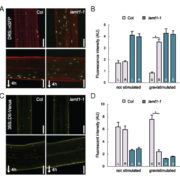Jasmonic Acid Inhibits Lateral Root Formation
 Architectural modifications of plant root systems enable plants to survive adverse conditions. Lateral roots, for example, help anchor the plant in the soil, and facilitate the uptake of water and nutrients from the soil. Auxin is a plant hormone essential to root development including the elongation and differentiation of root cells, gravitropism, root hair formation, and lateral root (LR) formation. Ishimaru et al. (10.1104/pp.18.00357) report that jasmonic acid (JA) functions as an inhibitor of lateral root formation. Treatment of wild-type Arabidopsis (Arabidopsis thaliana) with either (–)-JA or (+)-JA reduced primary root length and LR number. It was recently reported that some jasmonates have bioactivities distinct from the typical JA pathway that utilizes the (CORONATINE INSENSITIVE1 (COIl) JA receptor. dependent pathway. Thus, it is interesting that the effects of JAs on lateral root formation are also seen in a coi1 mutant. Treatment of seedlings with (–)-JA or (+)-JA suppressed auxin-inducible genes related to LR formation, diminished accumulation of an auxin reporter gene, and inhibited auxin-dependent degradation of DII-VENUS, a direct reporter of auxin levels. A structural mimic of (–)-JA and (+)-coronafacic acid also inhibited LR formation and stabilized DII-VENUS protein. These results reveal that JA and (+)-coronafacic acid are selective counter-auxins, a finding that could lead to new approaches for studying the mechanisms of LR formation.
Architectural modifications of plant root systems enable plants to survive adverse conditions. Lateral roots, for example, help anchor the plant in the soil, and facilitate the uptake of water and nutrients from the soil. Auxin is a plant hormone essential to root development including the elongation and differentiation of root cells, gravitropism, root hair formation, and lateral root (LR) formation. Ishimaru et al. (10.1104/pp.18.00357) report that jasmonic acid (JA) functions as an inhibitor of lateral root formation. Treatment of wild-type Arabidopsis (Arabidopsis thaliana) with either (–)-JA or (+)-JA reduced primary root length and LR number. It was recently reported that some jasmonates have bioactivities distinct from the typical JA pathway that utilizes the (CORONATINE INSENSITIVE1 (COIl) JA receptor. dependent pathway. Thus, it is interesting that the effects of JAs on lateral root formation are also seen in a coi1 mutant. Treatment of seedlings with (–)-JA or (+)-JA suppressed auxin-inducible genes related to LR formation, diminished accumulation of an auxin reporter gene, and inhibited auxin-dependent degradation of DII-VENUS, a direct reporter of auxin levels. A structural mimic of (–)-JA and (+)-coronafacic acid also inhibited LR formation and stabilized DII-VENUS protein. These results reveal that JA and (+)-coronafacic acid are selective counter-auxins, a finding that could lead to new approaches for studying the mechanisms of LR formation.


